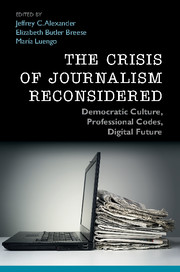Book contents
- Frontmatter
- Dedication
- Contents
- About the Contributors
- Preface
- Acknowledgments
- Introduction: Journalism, democratic culture, and creative reconstruction
- PART I THE CRISIS NARRATIVE
- PART II FEARS OF DIGITAL NEWS MEDIA: THE SYMBOLIC STRUGGLE
- PART III PROFESSIONAL JOURNALISM, CIVIL CODES, AND DIGITAL CULTURE
- 11 Journalism in American regional online news systems
- 12 Digital media and the diversification of professionalism: A US–German comparison of journalism cultures
- 13 Professional and citizen journalism: Tensions and complements
- 14 Expressions of right and wrong: The emergence of a cultural structure of journalism
- Conclusion: News innovations and enduring commitments
- Index
- References
12 - Digital media and the diversification of professionalism: A US–German comparison of journalism cultures
from PART III - PROFESSIONAL JOURNALISM, CIVIL CODES, AND DIGITAL CULTURE
Published online by Cambridge University Press: 05 June 2016
- Frontmatter
- Dedication
- Contents
- About the Contributors
- Preface
- Acknowledgments
- Introduction: Journalism, democratic culture, and creative reconstruction
- PART I THE CRISIS NARRATIVE
- PART II FEARS OF DIGITAL NEWS MEDIA: THE SYMBOLIC STRUGGLE
- PART III PROFESSIONAL JOURNALISM, CIVIL CODES, AND DIGITAL CULTURE
- 11 Journalism in American regional online news systems
- 12 Digital media and the diversification of professionalism: A US–German comparison of journalism cultures
- 13 Professional and citizen journalism: Tensions and complements
- 14 Expressions of right and wrong: The emergence of a cultural structure of journalism
- Conclusion: News innovations and enduring commitments
- Index
- References
Summary
INTRODUCTION
It is common sense in journalism studies that the most significant changes in news making today are connected to digital technologies. There is some disagreement, however, regarding how much journalism changes and stays the same. Most of the overtly universal claims about the state of journalism are based on research in the United States. Through a controlled comparison of a particular journalistic setting in the United States and Germany, this chapter finds different amalgamations of digital culture and professional journalism. It tells two interwoven stories, one that pluralizes common “future of journalism” scenarios, another about journalism in Germany and the United States.
Extensive qualitative field research at two state house press corps, one in Albany, New York, the other in Munich, Bavaria, has demonstrated that, although both groups of reporters have access to and use many of the same digital technologies, they had a much more profound impact on the practice and self-conception of journalists in the US case. The following two vignettes will illustrate this contrast:
A turning point in the professional lives of Albany reporters was when blogs became fixtures in state political news in 2006. Elizabeth Benjamin was at the center of this transition. When she changed positions from New York Daily News to news anchor and blogger for the Time Warner news channel YNN in 2010, she was portrayed by Columbia Journalism Review. The article was set up on the premise that Benjamin challenged the longstanding dominance of Fred Dicker (state editor of the New York Post at the time) within the state political news ecosystem. One important theme of the story was the conflict between traditional journalism and blogging. Before joining the Daily News, Benjamin had worked for the daily newspaper Albany Times Union (TU), where she launched a political blog in late 2005.
The portrait described the “modern local political blog” as “devotedly insider-ish, constantly updated, overseen by a hard-working obsessive, and very well-sourced.” A supervisor of hers at the TU, Bob Port, argued that Benjamin fits this profile: “She amassed such a huge audience in such a short time – there were about 10,000 uniques on the web reading her blog – it dwarfed anything else we were doing,” he says. It was the result of hard work. “She would feed stuff into it day and night.
- Type
- Chapter
- Information
- The Crisis of Journalism ReconsideredDemocratic Culture, Professional Codes, Digital Future, pp. 228 - 246Publisher: Cambridge University PressPrint publication year: 2016
References
- 7
- Cited by

